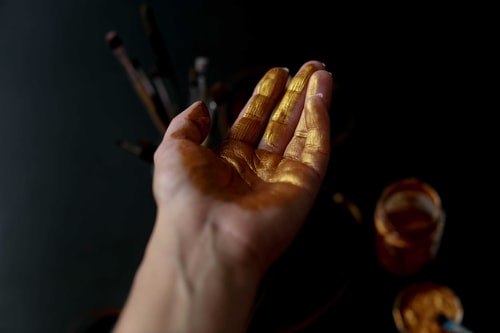Psalm 135 tells us that the idols of the nations are silver and gold, the work of human hands. It doesn't take heaps of imagination to surmise how silver and gold (and the power these afford) entice us centuries later. But notice the other thing the psalmist tells us: Idols are also the work of human hands, the fruit of our creative labours. Our capacity as human beings to be creative creatures helps to define our unique human birth right.
The problem of idolatry is a creativity malfunction. God isn’t anti-creativity — He gave us part of His own creative nature. He isn’t anti-gold or anti-silver, either. While our art-making and book-making and wealth-making are perfectly fine as human vocation, these creations make lousy gods.
Notice the psalmist’s indictment of the creative work of our hands: They have mouths but cannot speak; they have eyes but cannot see; they have ears but cannot hear; there isn’t breath in their mouths. Our creative output is fine as creative output, but as our creations, they have no life in themselves to do anything for us.
We are like God in that we can create, but only God can make truly creative creatures — human beings with ingenuity to make their own creations. (Of course, I’ll leave it to Peter Lynas and Jo Frost to sort out for us how we should all think about artificial intelligence. Be sure to subscribe to the Being Human podcast.)
So, we see the problem with idols isn’t their gold or our creativity; it’s about trusting in the work of our hands. Look at the tragedy of verse 18: Those who make them, become like them. So do all who trust in them.
When we fix our hope on the work of our hands, which cannot see, cannot hear, cannot speak, we regressively become more and more like the objects of our affection: spiritually blind, deaf and mute.
No matter how impressive our works, they are not ultimately trustworthy. Our productivity cannot save us. This is the tragic downward spiral of idolatry: when we trust in the work of our hands, we gradually become as lifeless as our creative projects. But unlike the idols of the nations, whatever the Lord pleases, He does, in heaven and on earth, in the sea and in all deeps (Psalm 135:6).
Remember all that talk about lifeless idols? Well, it’s the complete opposite with the living God. Idols have eyes and cannot see. But the eyes of the Lord run to and fro throughout the whole earth, to give strong support to those who fear Him (2 Chronicles 16:9). It is by trusting Him that we truly learn how to see.
The idols of the nations have ears and cannot hear. But our God heard even the inaudible cries from the mouth of Hannah outside the tent of meeting. It was her very promised son, Samuel, who heard the voice of God and cried out, “Speak, Lord, your servant listens” (1 Samuel 1 – 3). It is by listening to Him that we learn to hear.
The work of your hands, even if it has a mouth, cannot speak. But our God has a voice that can command the nothing to become everything. His voice can split the cedars and, yes, even make the deer give birth (Psalm 29:9). It is by trusting His word that we, like the prophets of God before us, can tear down kingdoms and raise them up (Jeremiah 1:10).
All the disruptions of our human nature are at their core caused by malfunctioning worship. We worshiped our way into this mess by trusting in the work of our hands. But the good news is, we worship our way out.
Jesus had a special warning and tenderness for the humanity-robbing results of our communal worship malfunction. After He had fed the five thousand and again another four thousand, His disciples forgot to bring the bread. Jesus warned His disciples: “Watch out; beware the leaven of the Pharisees and the leaven of Herod.”
Not quite getting the message, they began discussing the fact that they had no bread. So again, Jesus asked them, “Having eyes do you not see, and having ears to you not hear?” (Mark 8:15 – 17). In other words, Jesus was warning them from trusting in the gifts rather than the giver. It’s as though He was saying, “Why are you trusting in the bread in your hands when you have the bread of life sitting in the boat with you?”
Immediately after this episode in Mark’s gospel, Jesus healed a blind man. Then, finally, Peter seems to start seeing, and he made his famous declaration, “You are the Christ” (Mark 8:29). By calling the nations to turn aside from trusting dead works of their hands to the living God, Jesus invites the world into to the full restoration of our creativity, our culture, our true humanity.
True worship restores us into the image of the most fully human being of all, into the image of Jesus Christ.
"All the disruptions of our human nature are at their core caused by malfunctioning worship."



